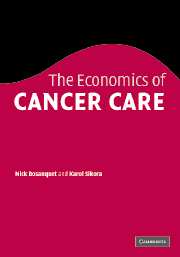Book contents
4 - Diagnostics
Published online by Cambridge University Press: 07 September 2009
Summary
Introduction
We now come to the linked stages from diagnostics to treatment and care programmes. The new model increases the pressure for change and re-engineering across these areas of diagnostics, surgery, radiotherapy, and chemotherapy. In each area there are new conflicts:
between new therapeutic options and available funding;
between established professional hierarchies and new opportunities for teamwork;
between traditional patient records and the quality of information technology required for managing personal care programmes;
diagnosis, imaging, and the beginnings of personalised medicine.
Here we set out the technological agenda and ask, what developments are likely in diagnosis? Diagnosis is the identification of malignancy in patients but it also has a broader dimension including the issue of screening and predisposition to cancer considered in Chapter 3. Classically, diagnosis is a sequence of activities. It originates with research, with identifying the features that distinguish a normal cell from a cancer cell. Traditionally this has been a morphological analysis, using light microscopy. More recently there have been various dyes, stains, and special techniques developed and we now have sophisticated molecular reagents, based on antibodies that can discriminate with precision between a normal and a malignant cell. This research has to develop further as we need an evidence base to provide proof of concept that these tools are actually robust in terms of their ability to discriminate.
- Type
- Chapter
- Information
- The Economics of Cancer Care , pp. 59 - 72Publisher: Cambridge University PressPrint publication year: 2006
- 1
- Cited by



